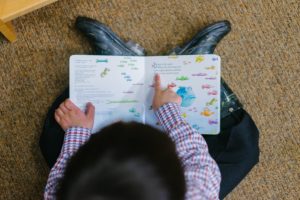What Is Summer Learning Loss?
The idea of students experiencing a learning loss during the summer has been discussed for decades.
Often referred to as the summer slide or brain drain, summer learning loss is a topic that continues to concern educators, researchers, and parents alike. Everyone can agree that children are ready for a break from school when the summer rolls around.
However, this much-needed break does not need to be a break from learning. Although all students are susceptible to some regression during the summer months, we have cause to be concerned about students who are considered at-risk for summer learning loss.
The reality of the summer reading loss is well-documented for those who are at-risk and already facing learning struggles.
Why Should We Worry About Summer Learning Loss?
Most sources related to the topic of the summer slide indicate that students may experience anywhere from one to three months of learning loss in one summer.
What is more concerning than the possible loss during one summer, is the cumulative losses for all summers during the elementary school years. The American Education Research Journal published a study in 2020 that documented learning growth in a group of students from grades 1 through 6.
The large study sample included 18 million students in 7,500 school districts. Results showed that 52% of these students lost an average of 39% of their total learning gains across the summer months.
The impact may have greater consequences when we total the losses for multiple summers. Several sources, including John Hopkins, report that this stacking effect accounts for 2/3 of the 9th-grade achievement gap between students from middle to low-income homes.
Who Is At-Risk of Experiencing Summer Learning Loss?
General reviews on the subject of summer learning loss tend to identify two primary groups of students who are most at-risk: those who have reading difficulties or disabilities and those from income-disadvantaged homes.
It may be worth adding students who are English language learners to this risk group, as studies have shown that these children may have fewer opportunities to practice speaking and reading English in their homes when school is not in session.
Students who fall into any of these at-risk categories are particularly disinclined to engage in independent reading activities during the summer. Students with learning disabilities spend 10 months struggling with the daily challenges of learning and tackling tasks that leave them exhausted and defeated.
The summer months offer these students time to focus on activities that highlight their abilities and rebuild their confidence. However, this population is especially at-risk for summer learning loss. The learning that occurs during the school year requires explicit instruction, guided practice, and multiple opportunities to apply learned skills.
Many of their targeted skills are left in a critical state of emergence on the last day of school. Words may still be transient and not permanently anchored into their automatic reading system.
If the learning process for reading is interrupted, it may put the student in a position to need to begin the learning all over again. If nothing else, careful attention should be given to maintaining these vulnerable skills and avoiding any signs of learning loss during the summer.
Making a commitment to assess students tri-annually can assist with identifying regression in student learning. Researchers have taken a closer look at student achievement gains from fall to spring and noticed that those students who gained the most stand to lose the most after the summer.
In short, the summer reading loss has the greatest impact on the students who can least afford it. If we carefully monitor student progress and look for those who make significant and marked learning gains from fall to spring, we can target students who are vulnerable to summer learning loss.
Evidence of an upward learning trajectory indicates that the student is responding to direct, explicit instruction and guided opportunities to engage with the appropriate materials-the type of learning that is provided daily in the classroom.
What Can We Do to Prevent Summer Learning Loss?
It is not enough to just say “read over the summer” to at-risk students in the face of summer reading loss. In addition, students do not need access to just any materials over the summer to promote learning, they need access to the right materials. The obvious recommendation to prevent the summer slide for at-risk students is participation in a high-quality summer literacy program.
However, there are a variety of obstacles for families to navigate when thinking about summer learning support for their children. Program cost, location, frequency, quality, and convenience are issues that can increase or decrease the probability of student access.
Although some school districts may offer free extended school year programs, not all students are eligible or able to access them. If the minimal goal is to help at-risk students to maintain vulnerable skills during the summer months, what advice can we offer to families to support their child at home and prevent summer learning loss?
Teachers can provide input and recommendations to help families weave critical skills into their days at home. Though it will not be possible to recreate the rigor of the school day, there are some simple strategies to promote skill maintenance in reading, writing, and technology.
Provide a book list and be sure to include information for accessing the local library or check out books on loan from the school library. Mark books that are selected for the student’s independent reading level vs. books that should be read with or by an adult. There is value in both.
Provide the student with a folder of words, sentences, and passages reflecting a mixed review of previously taught concepts and emerging into the student’s automatic reading system. Offer a chart that students can mark for points for participating in fluency reading each day. Include pre-stamped postcards to the school that the student can place in the mail each time s/he reaches a reading goal.
Ensure that students have access to audiobooks for the summer in a program that is accessible to them.
Help students access reading and writing in fun, practical ways during the summer. Students who enjoy building, baking, or science projects can read to follow instructions. Those who enjoy fishing, Legos, or animals can take to a hobby-themed magazine.
Students can relate writing or typing to their personal interests. They might keep a travel journal, connect with an out-of-state family member as a pen pal, or take up cartooning.
Provide families with ideas or lists for appropriately challenging vocabulary words. This can help guide parents to integrate words into conversation, experiences, or a game of charades.
Give parents ideas to make review and practice of concepts interactive in a game format. Games like Memory, Go Fish, Tic Tac Toe, and Hide-n-Seek can all facilitate reading and spelling practice (math facts, too).
Older students with WiFi access can find interesting content in ReadWorks Article-a-Day or challenge a family member to a typing fluency match with MonkeyType.
For those who are seeking summer support programs, it will be helpful to consider the following:
- Use the student’s tri-annual assessments as a guide to learned content. IMSE’s assessments are a great way to provide evidence of mastered concepts and identify concepts for maintenance.
- Look for reading programs that follow evidence-based instruction backed by the Science of Reading.
- Access resources that are provided by the student’s school.
- Be honest in discussing the student’s needs and specific goals for summer support. Some families may only be able to commit to a minimum amount of support, so considering a maintenance program may be best.
- Consider accessing a tutor online. Most students have developed remote learning skills during the past year and this option may combat problems with convenience or transportation.
Summer Learning Loss and COVID-19
 During the coronavirus pandemic, summer learning programs will be especially important for students who are considered to be at-risk. Experts are planning for evident learning shortfalls when students return to their classes in the fall.
During the coronavirus pandemic, summer learning programs will be especially important for students who are considered to be at-risk. Experts are planning for evident learning shortfalls when students return to their classes in the fall.
In regards to a year of remote learning, NWEA suggests that without summer reading, students will only retain about 70% of their progress compared to a typical school year. Our at-risk student group and those who were without internet access or home computers are expected to face the greatest impact.
As parents and professionals, it is our responsibility to work to help at-risk students to find a balance to enable them to have a well-deserved break from school, while maintaining the learning gains that were established during the school year.
Thankfully, teachers are creative individuals by nature. Once we have recognized a problem, we are already working towards a solution. Communication and collaboration with parents and students can establish a support system that bridges the gap from spring to fall and helps in the prevention of summer learning loss.
Resources
AER Journal, July 9, 2020
NWEA, July 6, 2019
https://www.readworks.org/rw/new-readworks-article-day-sets
https://www.audible.com/ep/audiobooks
https://www.magazineline.com/kids-magazines
About the Author
 Dr. Kirstina Ordetx is a Level 4 Master Instructor with The Institute for Multi-Sensory Education (IMSE). She holds a doctorate in Counseling Psychology with a concentration in pediatric neurology. Dr. Ordetx is an educational specialist with over 25 years of clinical experience, research, and consultation. She is a certified Structured Literacy Dyslexia Interventionist through the Center for Effective Reading Instruction, a Certified Nutrition and Wellness Consultant, Executive Functions Coach, and a registered Licensed Mental Health Intern. Dr. Ordetx has published two books that compile her research and practice in Theory of Mind. She has served on accreditation committees for the Florida Council of Independent Schools, is a university adjunct professor in developmental and child psychology, and presents at various national and international conferences. Dr. Ordetx is head of school for a private academy in Lakewood Ranch, Florida specializing in the multi-sensory education of students who have language and learning-based differences. She is the Executive Director of the Pinnacle Pediatric Therapy Group, a multi-disciplinary, pediatric therapy clinic.
Dr. Kirstina Ordetx is a Level 4 Master Instructor with The Institute for Multi-Sensory Education (IMSE). She holds a doctorate in Counseling Psychology with a concentration in pediatric neurology. Dr. Ordetx is an educational specialist with over 25 years of clinical experience, research, and consultation. She is a certified Structured Literacy Dyslexia Interventionist through the Center for Effective Reading Instruction, a Certified Nutrition and Wellness Consultant, Executive Functions Coach, and a registered Licensed Mental Health Intern. Dr. Ordetx has published two books that compile her research and practice in Theory of Mind. She has served on accreditation committees for the Florida Council of Independent Schools, is a university adjunct professor in developmental and child psychology, and presents at various national and international conferences. Dr. Ordetx is head of school for a private academy in Lakewood Ranch, Florida specializing in the multi-sensory education of students who have language and learning-based differences. She is the Executive Director of the Pinnacle Pediatric Therapy Group, a multi-disciplinary, pediatric therapy clinic.
Sign up for our LIVE virtual Orton-Gillingham training! We are now offering half-day, evening, and weekend options to best fit your schedule.
The IMSE approach allows teachers to incorporate the five components essential to an effective reading program into their daily lessons: phonemic awareness, phonics, vocabulary, fluency, and comprehension.
The approach is based on the Orton-Gillingham methodology and focuses on explicit, direct instruction that is sequential, structured, and multi-sensory.
It is IMSE’s mission that all children must have the ability to read to fully realize their potential. We are committed to providing teachers with the knowledge and tools to prepare future minds.
Please connect with us on Facebook, Twitter, and Pinterest to get tips and tricks from your peers and us. Read the IMSE Journal to hear success stories from other schools and districts, and be sure to read the OG Weekly email series for refreshers and tips.
